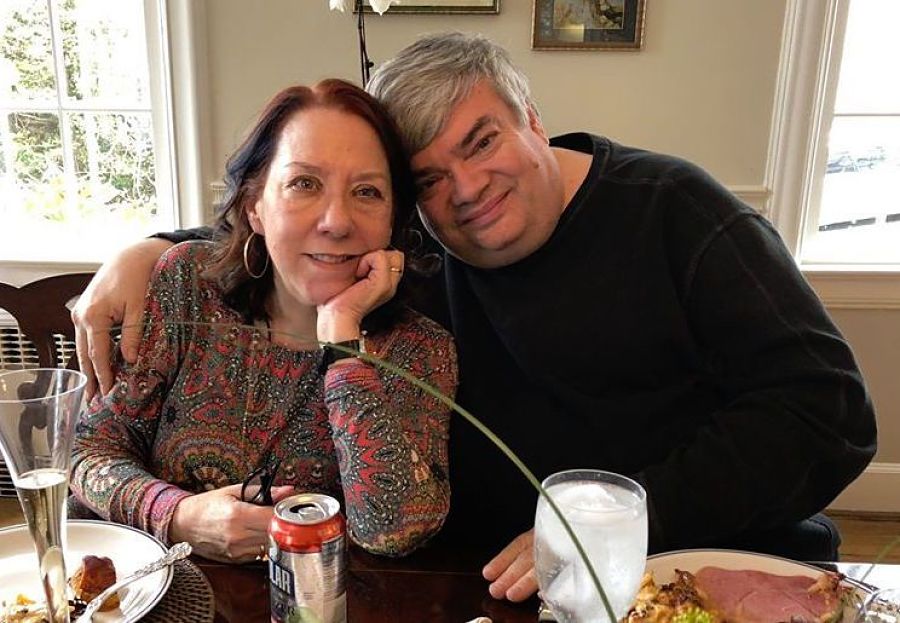Terry Teachout, drama critic for the Wall Street Journal, who also wrote plays, biographies, and opera libretti, as well as co-hosting American Theatre‘s Three on the Aisle podcast, died on Jan. 13. He was 65.
What does it mean to be fully human if it doesn’t include holding onto both a deeply personal sense of the world and an ability to love someone who doesn’t share yours?
That, for me, was the life lesson Terry Teachout imparted, again and again, over the four years we spent behind microphones together, in dozens of spirited debates. Terry’s death last week hit particularly hard for many of us in the theatre, journalism, and music worlds. Not just because it was so sudden, or even because Terry himself endured such heartache, with the death in 2020 of his wife Hilary, who herself suffered for so long with a terminal illness.
It was also because Terry embodied something more ephemeral. I like to think of it as grace.
This might not seem the attribute one confers on a scribe whose decades-long trade was judgment on the work of others. Although everyone wants to be thought as nuanced, we all also have a propensity to affix fast labels to others. Critics of the arts, in the popular imagination, are cold-eyed taskmasters with a chip on one shoulder and a pedant whispering to them on the other.
Terry, Elisabeth Vincentelli, and I started a podcast in 2017, Three on the Aisle, in part to dispel the idea of the theatre critic as one-dimensionally unyielding or hermitic or prone to calcified orthodoxy. Our collaboration resulted from an appearance together on a TV show, Theater Talk. We discovered that in spite of our divergent tastes, we enjoyed one another’s company—a pleasure that we sustained until our final podcast, a month before Terry died.
You’ll read in the excellent obituaries about Terry of his wide-ranging accomplishments as a biographer, playwright, and critic, all of which are estimable. As a theatre writer for more than 20 years at the Wall Street Journal, he carved out an unusual niche, traveling routinely outside his home base in New York, reviewing productions in far-flung communities in New England, the Midwest, and beyond. He curated a narrative about the richness of theatre in America—one that thrived far from the precincts of Times Square or the theatrical hegemony of cultural hubs like London.
He was one of a vanishing breed, the cultural omnivore, as conversant with Chopin and Satchmo as he was with Shakespeare. He even wrote (and occasionally directed) a play about Louis Armstrong, Satchmo at the Waldorf, based on his acclaimed biography. His musicological acumen gave him unusual standing among drama critics, but his rigor didn’t mean he was a cold fish: From his own seat on the aisle, he treated audiences on press nights to an unmistakable high-pitched laugh, which sounded like the mating call of a whooping crane. Sitting behind him on numerous occasions, I recognized in the rhythmic heaving of his shoulders another Terry trait: He was also a softie. Tears flowed easily for him, and often.

It confounds some people that his politics swung to the right. That made him something of an outlier in a theatre world in which a more progressive ideology can seem a prerequisite for legitimacy. But conversing with Terry never amounted to a skirmish in the culture wars. His passion for the craft and elemental power of the stage were the crux of every discussion. In his advocacy for a vibrant, literate, inclusive theatre, Terry was most assuredly an inlier.
You can read about his dramatic preferences elsewhere—and most persuasively, in his own encyclopedic body of work. He wrote seemingly inexhaustibly not only for the Journal but for arts blogs and for magazines. He was also an exuberant presence on Twitter, where in addition to his enthusiasms for plays, movies, books, and people, he shared (far more than I ever would) the details of his personal travails. It endeared him to other Twitter users he never otherwise met—fellow mourners from whom I’ve been hearing in large numbers since his death. I’ve been hearing, too, from artists who admired him, including many actors and writers he championed and counseled.
Death, actually, was a subject Terry never shied from talking about. I’ll tell you when our bond was cemented: It was after my mother died, suddenly, during the summer of 2018. She hit her head in a fall at home and never woke up. Over the next several weeks, Terry implored me to talk about it with him. He kept at me until I agreed to join him at a diner in midtown Manhattan after we’d taped an episode. “I know something about this,” he said to me. He spoke of the death of his own mother, of the long, slow evolution of grief, of allowing yourself to acknowledge all of the ups and downs, of understanding that the anger of being left alone is reasonable. It was an outreach I had not realized I needed until Terry spoke up.
Anyone who followed Terry on social media knows of the extraordinary struggle he and Hilary were going through for much of the time Elisabeth and I recorded shows with him. We grew accustomed to the countenance of a weary Terry in our midst, as he and Hilary waited, with ever-mounting anxiety, for a suitable transplant donor for her diseased lungs. There were heartbreaking false alarms and last-minute changes of plans by donor families—sorrows piled on agonies. Pursuing this mission, Terry remained stoically committed, and occasionally confessed to being tired to the bone. How he kept up with his job through the months and years of this, I’ll never know.
You watch helplessly as a friend passes through the stages of an ordeal. From the jubilation over the transplant operation occurring at last—during the height of a pandemic—to the devastation when the surgery failed, the heart leapt, then hit the floor. The pandemic peaked in New York as Terry lost Hilary, and he had to manage his grief largely in solitude.
Then, as the conditions of the pandemic metamorphosed, so did Terry’s spirits. He met Cheril, a new love. When I saw him recently at the theatre, Terry was with Cheril. I thought back to the last times I’d seen him at the theatre with Hilary, Terry gently taking her fragile arm and guiding her out of her seat, a man evincing patience and care. And grace.
I am glad that in his final months, he found some consolation—and happiness—again.
Peter Marks is theatre critic for the Washington Post.


